Almost 100,000 coronavirus deaths have already been prevented by England’s landmark vaccine roll-out, health chiefs say.
Public Health England also estimates the jabs have stopped tens of thousands of hospitalisations and millions of infections.
The Government-run agency said the figures — based on modelling by academics — are evidence of just how well the vaccines really work.
While Health Secretary Sajid Javid said: ‘The UK’s phenomenal vaccination programme has made a life-changing difference to tens of millions of people across the country.’
Britain is now gearing up to dish out Covid booster jabs at the start of September, in hopes of keeping immunity high in the face of future flare-ups this autumn and winter. One SAGE expert today warned the high case numbers were ‘very worrying’ and warned ‘we just don’t really know what’s going to happen’ in the coming months.
The US yesterday confirmed all over-18s would be eligible for top-up doses, and Israel — which is currently being battered by a third wave — is already offering over-60s a third jab. There are fears that the vaccines lose potency over time, which some experts have said is part of the reason why Israel is being battered currently.
But No10’s top advisers — who met today to discuss the controversial topic — have yet to make a final decision on whether the programme should even go ahead, sources say.
One member of the expert panel the Joint Committee on Vaccination and Immunisation (JCVI) told The Guardian: ‘The jury is still very much out on what happens.’
Another today hinted the programme would only be open to the most vulnerable adults, and said the inoculation drive could still be expanded to all over-12s.
Meanwhile, all 16 and 17 year olds are now being invited by the NHS to come forward for their Covid jabs. Letters will land on doorsteps from today and follow up text messages will be sent tomorrow.
Health bosses gave older teenagers the green light to get vaccinated at the start of August. Around 125,000 teens who are within three months of turning 18 have been jabbed since the decision was made.
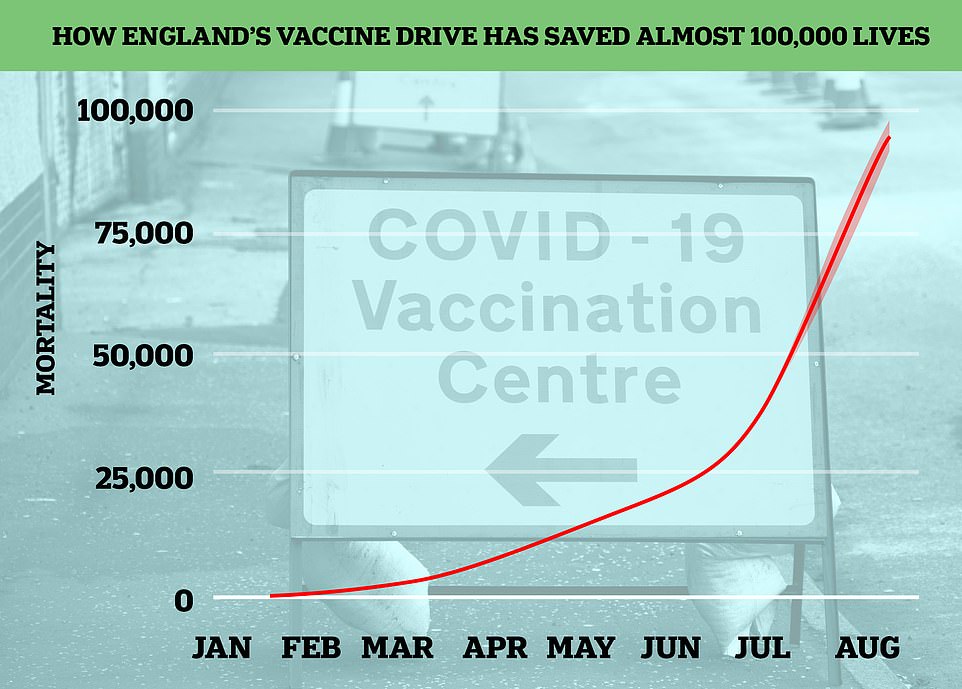
The roll-out is estimated to have averted between 91,700 and 98,700 deaths, according to the latest estimates from PHE and Cambridge University modellers
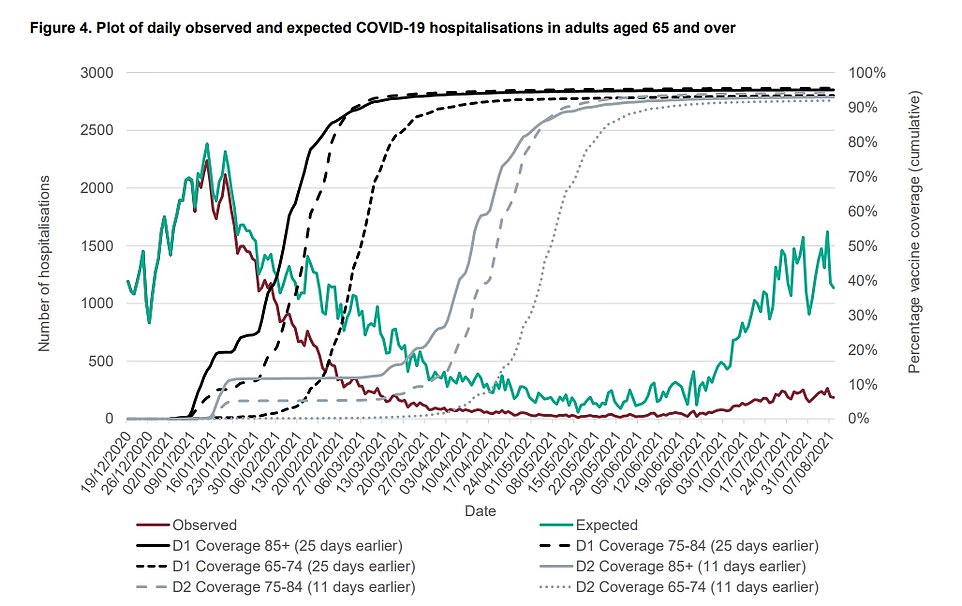
The latest estimates also indicate that the vaccination programme, which kicked off last December, has directly averted more than 82,100 hospital admissions among over-65s
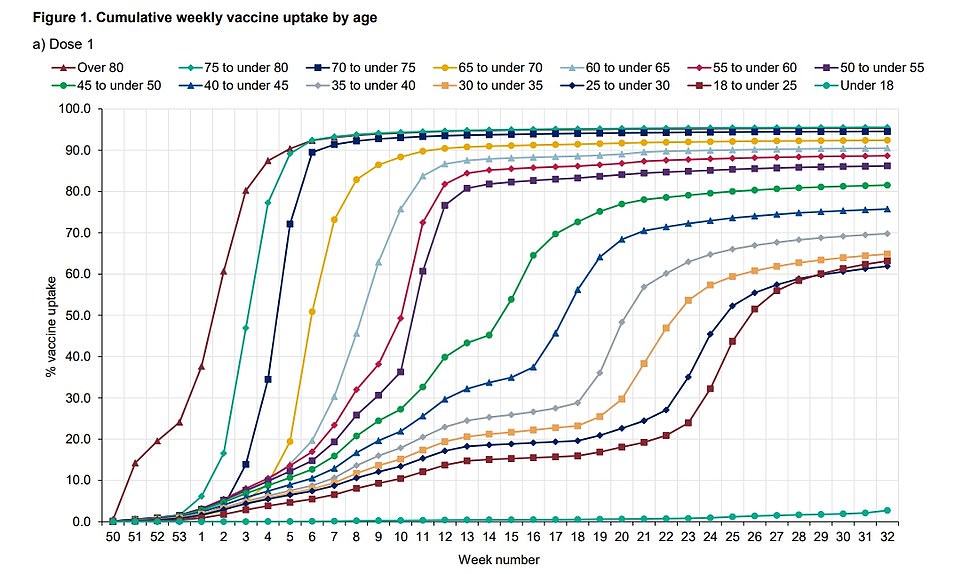
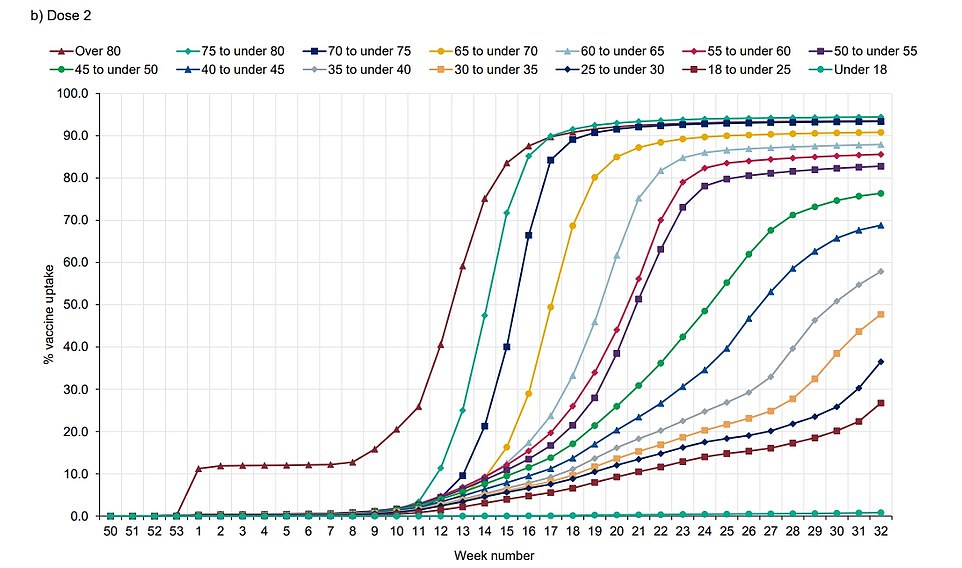
The roll-out is estimated to have averted between 91,700 and 98,700 deaths, according to the latest estimates from PHE and Cambridge University modellers.
The latest estimates also indicate that the vaccination programme, which kicked off last December, has directly averted more than 82,100 hospital admissions among over-65s.
And between 23.6million and 24.4million actual infections are thought to have been prevented, the PHE weekly vaccine surveillance report claimed.
But experts have accused the modellers to be ‘away with the fairies’ for making the claim on infections, saying it appeared mathematically impossible.
Praising the updated estimates today, Mr Javid said the figures show that the vaccines are ‘continuing to keep all of us safe’.
He said: ‘We’re quickly closing in on 100,000 lives being saved in England alone.
‘With 82,100 hospitalisations prevented in over-65s and almost 24million infections prevented across England, the vaccines are continuing to keep all of us safe.’
Data also showed the number of pregnant women getting a vaccine has risen by a fifth in recent weeks, following a concerted effort by health officials to reassure expectant mothers.
Mr Javid said: ‘It’s also hugely encouraging to see over 62,000 pregnant women taking up the offer and ensuring they and their babies are protected from this dangerous disease.
‘The vaccines are free and available at hundreds of locations around the UK — please get your jabs to secure this protection for yourself and your loved ones and help us reclaim our lost freedoms.’
It comes after one of No10’s scientific advisers today admitted Britain’s roll-out may still be expanded to all over-12s.
The Joint Committee on Vaccination and Immunisation, which advises ministers, is ‘carefully and continuously’ looking at data from countries which already offer jabs to youngsters, such as the US and Israel.
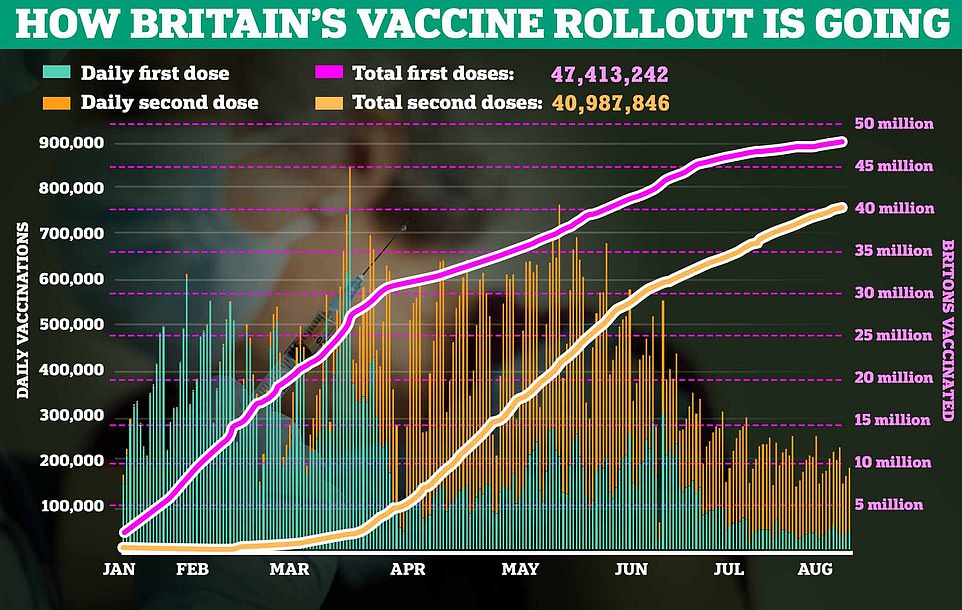

The Government has not yet given a timeline on when 16 and 17-year-olds can start coming forward for jabs. But even if the roll-out out to older teenagers begin straight away, there will only be time to give them one dose by the time the school year begins on September 6

Professor Adam Finn said the JCVI ‘carefully and continuously’ looking at safety data from other countries on jabbing youngsters, JCVI member Professor Adam Finn said.
Just two months ago, the JCVI insisted there was no evidence to say the benefits of vaccinating children outweighed the risks, given that youngsters face such a low risk of dying or falling seriously ill.
But the expert panel has already U-turned to say that all 16 and 17 year olds should get jabbed.
JCVI member Professor Adam Finn said it is ‘hard to predict’ whether the group will also recommend it to 12-15 year olds. He admitted the decision was a ‘tricky one’.
The major safety concern centres on a heart condition called myocarditis, which is a known complication with Pfizer’s vaccine.
The side effect, a type of heart inflammation that appears to strike after the second dose, is more common in teenage boys and affects up to one in 20,000 youngsters given the jab. However, most cases are mild, health chiefs insist.
With Pfizer’s vaccine currently being the only one British children are eligible to get, experts have raised concerns about the risks.
UK officials have also yet to make firm plans for children to get top-ups. They want to wait for more safety data about myocarditis before pressing ahead.
But health chiefs have hinted that it is more likely than not all over-12s will be offered a coronavirus vaccine in the coming months.
It comes as the UK’s medicines watchdog approved the Moderna jab for over-12s this week, after approving Pfizer for use in the same group in June. But officials have yet to formally recommend it for use in the current roll-out.
Asked if the vaccination programme in the UK might soon include 12 to 15-year-olds, Professor Finn told BBC Radio 4’s Today programme: ‘Hard to predict the answer on that. We’re very focused on what’s happening elsewhere.
‘We are concerned about the safety signal, the myocarditis signal.
‘And we are recognising increasingly that actually children, even adolescents, really very seldom get seriously ill with Covid, so that it makes it a very marginal decision that they will benefit by being immunised.
‘So we are obviously looking at that very carefully and continuously, but hard to predict really which way that’s going to go.’
He said vaccinating children to protect more vulnerable groups, such as their grandparents, is ‘a tricky one’.
Professor Finn, who is also an expert in paediatrics at the University of Bristol, said: ‘To immunise a child for the benefit of other family members who themselves can be protected by being immunised, you know, that begins to become slightly tricky to decide.
‘I think we’re all much more comfortable immunising people where they actually themselves benefit from the immunisation and that that’s clear cut.’
Health chiefs have already hinted 12 to 15-year-olds could be offered the jab in the future.
Professor Van-Tam, England’s Deputy Chief Medical Officer said at a news conference earlier this month that ‘it is more likely rather than less likely that that list will broaden over time as data becomes available’ as the JCVI continues to review emerging evidence.
As it stands, children aged 12 to 15 are only eligible if they have a severe neurodisability, Down’s syndrome, underlying conditions resulting in immunosuppression, profound or multiple learning disabilities, severe learning disabilities, or those who are on the learning disability register.
The Medicines and Healthcare Products Regulatory Agency approved the Pfizer jabs for over-12s in June and on Tuesday said the Moderna vaccine is also ‘safe and effective’ in the new age groups.
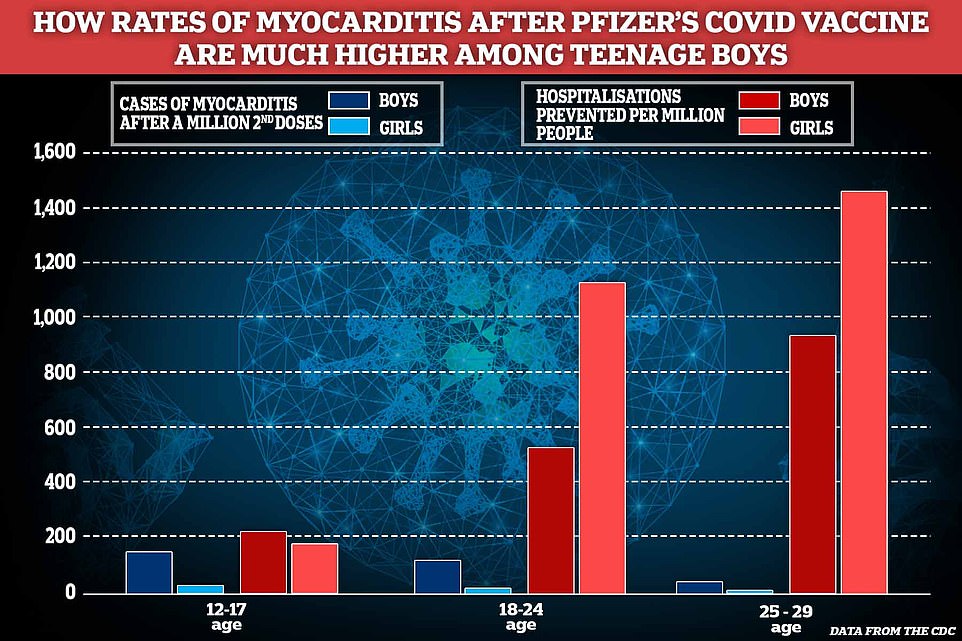
Number of pregnant women getting jabbed rises by a fifth in past fortnight, data shows
The number of pregnant women getting a Covid vaccination has risen by a fifth in recent weeks.
It follows a concerted effort by health officials to reassure expectant mothers about the safety of getting a jab.
A total of 62,311 women, who reported they were pregnant or could be pregnant at the time of receiving the vaccine, had come forward and received their first dose by the end of July, Public Health England said.
The number is up by 10,587 from July 18, when data released for the first time suggested only around one in 10 pregnant women might have had a first dose.
PHE said that, of the latest total figure, 43,737 pregnant women had received their second dose.
Separate research last month revealed the vast majority of pregnant women admitted to hospital with Covid-19 are unvaccinated and there has been a drive to encourage more to get a jab, with England’s chief midwife writing to GPs and fellow midwives to spread the message.
Research by a team at St George’s, University of London, published this month, showed similar birth outcomes between those who have had a Covid-19 vaccine and those who have not.
Experts said pregnant women should feel reassured by the paper, which concluded there were no statistically significant differences in the data, with no increase in stillbirths or premature births, no abnormalities with development, and no evidence of babies being smaller or bigger.
A study is continuing to determine the best gap between coronavirus vaccine doses for pregnant women.
Researchers are aiming to recruit more than 600 pregnant women for the trial, which will monitor the vaccine’s effectiveness and follow the development of children up to one year old.
In the UK, pregnant women are offered the Pfizer/BioNTech or Moderna vaccines where available, as officials say there is more safety data on these jabs in pregnancy.
Advertisement
Several countries around the world are already vaccinating over-12s — including the US, Israel, France, Spain and Germany — making the UK the outlier for picking the over-16s age group.
Studies found the jabs to be safe and effective for over-12s, leading Pfizer and Modern to trial their jabs in under-11s.
And University of Oxford scientists are testing the AstraZeneca jab on children as young as six.
But some have pushed back on younger groups being jabbed, because they tend to have no or mild symptoms.
Fewer than 30 under-18s have died of Covid in the UK since the pandemic began — which scientists say is the equivalent of around one in 500,000 who get infected.
But scientists say immunising children will slow the spread of the virus, reduce numbers having to take time off school to isolate and build up immunity across the population.
But UK health chiefs are being cautious due to reports of rare heart inflammation conditions.
Data from the US shows those aged 12-17 are at the most risk of developing the heart problem after a Covid jab, compared to other age groups.
In that group, 10 cases of myocarditis were reported per million first doses given. This rises to 67 per million after the second dose. Most people recovered quickly.
There are no specific causes of the conditions but they are usually triggered by a virus.
The British Heart Foundation says in some cases, myocarditis can affect the heart’s electrical system, stopping it from pumping properly. ‘This can cause an abnormal heart rhythm, known as an arrhythmia,’ it claims.
But British regulators insist the 250 cases seen among Pfizer recipients are ‘typically mild’. Affected patients recover ‘within a short time with standard treatment’.
Meanwhile, data showed the number of pregnant women getting a Covid vaccination has risen by a fifth in recent weeks.
It follows a concerted effort by health officials to reassure expectant mothers about the safety of getting a jab.
A total of 62,311 women, who reported they were pregnant or could be pregnant at the time of receiving the vaccine, had come forward and received their first dose by the end of July, Public Health England said.
The number is up by 10,587 from July 18, when data released for the first time suggested only around one in 10 pregnant women might have had a first dose.
PHE said that, of the latest total figure, 43,737 pregnant women had received their second dose.
Separate research last month revealed the vast majority of pregnant women admitted to hospital with Covid-19 are unvaccinated and there has been a drive to encourage more to get a jab, with England’s chief midwife writing to GPs and fellow midwives to spread the message.
Source link : https://www.dailymail.co.uk/news/article-9908919/Almost-100-000-Covid-deaths-prevented-Englands-vaccine-roll-out.html











